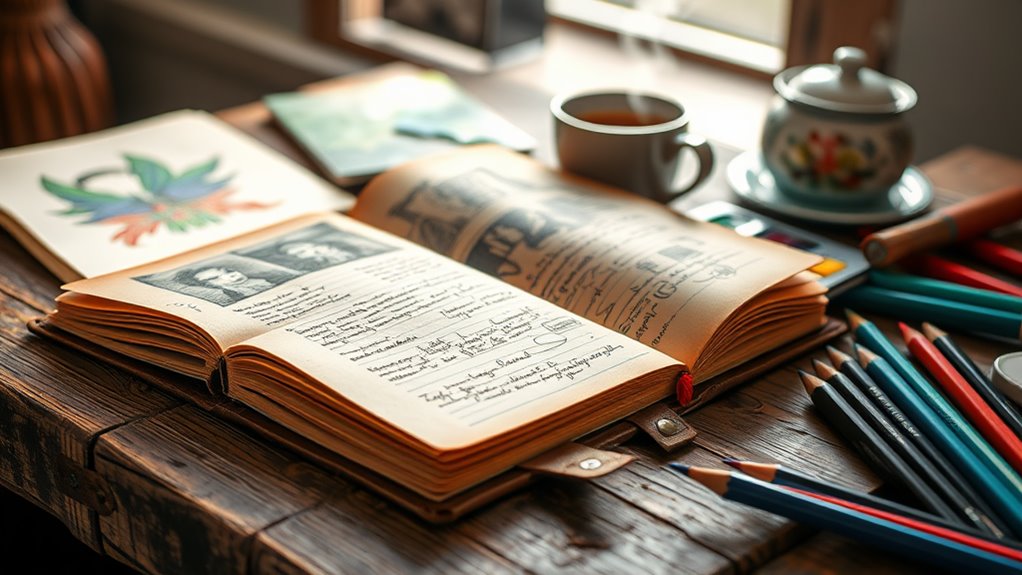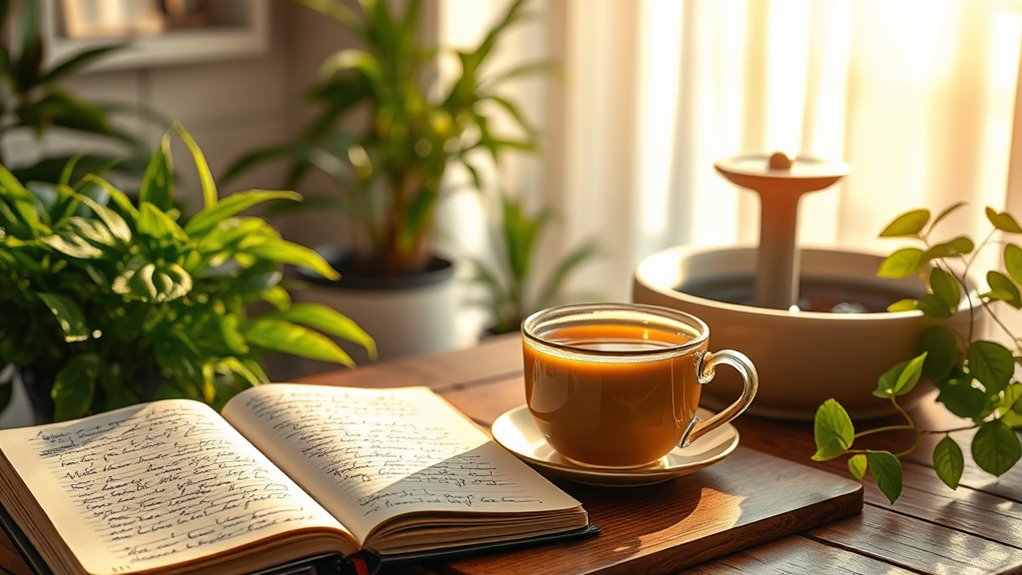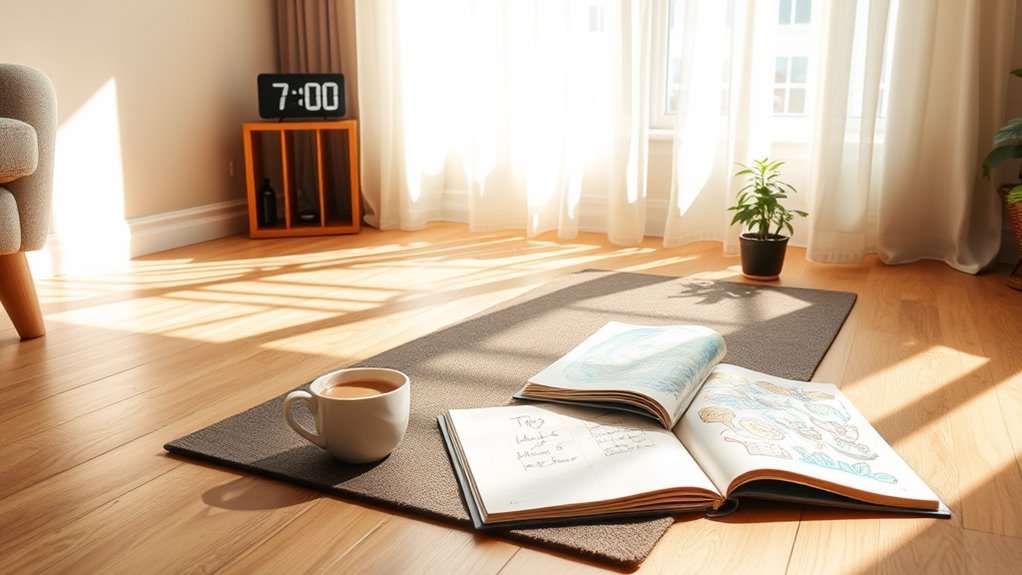How Journaling Every Day Will Boost Your Creativity
Journaling every day boosts your creativity by providing a space for your ideas to flow freely. It helps you silence your inner critic, fostering self-awareness and compassion. You’ll tap into unconventional thinking, leading to innovative solutions and fresh perspectives. Plus, through reflection, you’ll enhance your mental clarity and emotional well-being. As you embrace experimentation, you’ll discover new techniques to nurture your ideas safely. Explore how consistent journaling can transform your creative journey even further.
Key Takeaways
- Daily journaling fosters free-flowing ideas, enhancing creativity by allowing exploration of thoughts without judgment.
- It externalizes the inner critic, promoting self-awareness and compassion, which nurtures authentic creative expression.
- Journaling encourages experimentation and risk-taking, pushing creative boundaries to discover innovative solutions.
- Techniques like stream-of-consciousness writing stimulate unconventional thinking, leading to fresh perspectives and problem-solving skills.
- Regular reflection through journaling enhances emotional clarity, reducing stress and mental clutter, paving the way for greater creative output.
The Power of Daily Journaling for Creativity
When you embrace daily journaling, you release a powerful tool for enhancing your creativity. This practice not only fosters free-flowing ideas but also ignites innovative thinking.
By committing to journaling, you create a space to explore affirmations that reinforce your creative potential. The act of documenting your thoughts encourages experimentation and cultivates your imagination, leading to fresh insights. Journaling also fosters a deeper connection with your inner voice, allowing for more authentic expression. Engaging in this practice can significantly enhance creativity through clarity and increased self-awareness.
Techniques like morning pages and sensory experiences help sharpen your descriptive skills and boost your creative expression. As you record spontaneous ideas and questions, you’ll find new avenues for exploration.
Ultimately, regular journaling nurtures your artistic development, transforming your creative process into an exhilarating journey of self-discovery and mastery.
Silencing the Inner Critic
As you commence your creative journey, silencing the inner critic can be essential to revealing your full potential. This voice often judges and demeans you based on skewed perceptions, undermining your confidence and emotional well-being.
Understanding the various types of inner critics, like The Perfectionist or The Guilt Tripper, allows you to identify specific patterns that hinder your creativity. Journaling serves as a powerful tool to confront and manage these critical thoughts. By expressing your feelings freely, you externalize the inner critic, fostering greater self-awareness and compassion. Establish a regular journaling practice, using techniques like stream-of-consciousness writing, to challenge negative narratives and reclaim your creative confidence. Additionally, recognizing the inner critic’s protective intentions can help you view these thoughts with a more compassionate perspective. This practice can enhance your overall well-being and transform your life through the positive effects of self-reflection.
This disciplined approach can transform your relationship with self-criticism, enhancing your creative expression.
Unlocking Unconventional Thinking
Unfastening unconventional thinking can open doors to innovative solutions and fresh perspectives. To ignite this creativity, practice random word association to stimulate new connections or engage in reverse brainstorming to uncover hidden solutions. Employ analogical thinking by drawing insights from unrelated fields, and use provocative statements to challenge the norm. Regularly ask “what if” to expand your thought horizons and utilize mind mapping for visual clarity. Incorporating lateral thinking strategies can significantly enhance your creative output and problem-solving capabilities. Additionally, integrating daily affirmations into your journaling practice can further cultivate a positive mindset that fuels creativity. Embrace childlike curiosity and collaborate with others to broaden your creative landscape. By questioning assumptions and setting creative challenges, you’ll foster a judgment-free environment for exploration. Embrace these techniques in your journaling practice, and watch as your creativity flourishes in unexpected ways.
Mental Clarity Through Reflection
Reflecting through journaling can greatly enhance your mental clarity by allowing you to process emotions and thoughts more effectively. Here’s how this practice sharpens your focus:
-
Increased Self-Awareness: By recognizing your emotions, you gain insights that improve your understanding of your thoughts and feelings. Engaging in this practice also increases self-awareness, a key component of emotional intelligence. Additionally, journaling can promote mindfulness practices, which help you stay present in the moment.
-
Emotional Processing: Writing helps release emotional intensity, leading to a calmer state of mind and clearer thought processes.
-
Thought Clarification: Journaling provides a structured space to evaluate your priorities, organizing tasks and ideas for effective action.
Through these elements, journaling not only reduces mental clutter but also cultivates mindfulness, allowing you to stay present and centered.
As you engage in this reflective practice, you’ll find your mental clarity greatly enhanced, paving the way for greater creativity.
Embracing Experimentation and Innovation
Your journal is a safe space where you can freely explore new ideas without judgment. By encouraging risk-taking, you push past creative boundaries and discover innovative solutions. Embracing experimentation in your writing can lead to unexpected breakthroughs and growth. Additionally, incorporating positive affirmations into your journaling practice can further enhance your creative mindset.
Safe Space for Ideas
Creating a safe space for ideas is essential for fostering an environment where experimentation and innovation can thrive.
When you cultivate this space, you encourage open dialogue and empower team members to share diverse perspectives.
Here are three key elements to take into account:
-
Supportive Communication: Establish guidelines for respectful exchanges, ensuring everyone feels valued and heard.
-
Psychological Safety: Encourage risk-taking by framing failures as learning opportunities, which reduces anxiety and sparks bold ideas.
-
Inclusivity: Promote diverse voices in decision-making, enhancing the creative process and minimizing groupthink.
Encouraging Risk-Taking Behavior
As you embrace experimentation and innovation, encouraging risk-taking behavior becomes essential for releasing your creative potential.
Creativity thrives on exploring new ideas and taking calculated risks, especially in social contexts. Journaling can serve as your catalyst; it prepares your mind to embrace uncertainty by fostering an openness to experimentation.
By writing about potential risks, you can assess them objectively, turning fear into informed decisions. The confidentiality of journaling allows you to contemplate risks without judgment, nurturing a safe space for exploration.
Consistently journaling builds confidence, making you more willing to take creative leaps. Each entry not only chronicles your progress but also enhances your divergent thinking, paving the way for innovative breakthroughs in your creative endeavors.
Breaking Creative Boundaries
While many people feel confined by traditional boundaries, breaking creative limits can lead to extraordinary breakthroughs.
Embracing experimentation allows you to challenge assumptions and explore uncharted domains, fostering innovation and resilience.
Here’s how to push your creative boundaries:
-
Question Norms: Continuously critique established beliefs to discover fresh perspectives and spark new ideas.
-
Experiment with Styles: Try different techniques or artistic styles to diversify your creative repertoire and prevent stagnation.
-
Explore New Media: Investigate various tools or platforms, pushing your creativity into new areas and uncovering hidden potential.
Enhancing Problem-Solving Skills
Journaling can greatly enhance your problem-solving skills by fostering cognitive reflection and critical thinking. When you regularly jot down your thoughts, you create a space for analyzing experiences and evaluating solutions.
This practice encourages creative thinking, allowing ideas to flow freely without judgment. By reflecting on past challenges, you can identify patterns and refine your strategies for future problems.
Additionally, journaling helps break down complex issues into manageable components, training your mind to approach problems systematically. As you set clear goals and track your progress, you sharpen your focus and enhance your critical thinking.
Ultimately, the insights gained through journaling empower you to connect diverse concepts and tackle challenges with clarity and confidence.
The Role of Journaling in Emotional Well-Being
Emotional well-being hinges on our ability to process and express feelings effectively. Journaling serves as a powerful tool for enhancing this ability, enabling you to manage your emotions better.
Here are three key benefits:
-
Reduce Stress and Anxiety: By externalizing your worries, journaling allows you to confront and manage overwhelming emotions, leading to improved mental health.
-
Improve Emotional Regulation: Writing clarifies your thoughts, helping you identify triggers and develop strategies for emotional control.
-
Foster Self-Awareness: Tracking your thoughts and behaviors boosts self-awareness, supporting personal growth and healthier mindset shifts.
Using Journaling Prompts for Inspiration
Journaling prompts can open doors to new perspectives and stimulate fresh ideas you mightn’t have considered.
When you face creative blocks, these prompts serve as powerful tools to spark your imagination and push through barriers.
Exploring New Perspectives
One powerful way to spark creativity is by using journaling prompts that encourage you to explore new viewpoints. By engaging your senses and reflecting on personal experiences, you can uncover unique insights that fuel your creative endeavors.
Here are three effective prompts:
- Describe a vivid memory using all five senses. What emotions arise as you reflect on it?
- Write about a challenge you’ve faced and list three lessons learned. How can these lessons influence your current projects?
- Imagine experiencing a day in someone else’s shoes. What new insights do you gain from this angle?
Using these prompts regularly not only enhances self-awareness but also cultivates a deeper connection with your emotions, ultimately enriching your creative process.
Stimulating Fresh Ideas
While you might face occasional creative blocks, using journaling prompts can ignite fresh ideas and inspiration. These prompts encourage regular idea generation, capturing thoughts and insights that spark creativity. By jotting down inspiration as it strikes, you prevent valuable ideas from slipping away.
Journaling also fosters interconnected thinking, allowing you to link seemingly unrelated concepts, which enhances innovative thinking. Embrace divergent thinking by exploring various perspectives through prompts that challenge your imagination. Mind mapping in your journal visualizes these connections, further stimulating creativity.
Whether you use creative writing prompts or engage in art journaling, these techniques expand your creative horizons, helping you cultivate a rich reservoir of ideas for your projects.
Overcoming Creative Blocks
Creative blocks can feel overwhelming, but using journaling prompts can be a powerful way to break through them.
These prompts encourage structured thinking and ignite your imagination. Here are three effective strategies to harness their potential:
-
Stream-of-Consciousness Writing: Allow your thoughts to flow freely, uncovering hidden ideas and perspectives.
-
Emotional Exploration: Write about your feelings and thoughts to clarify your inner dialogue, fostering creativity.
-
Reflective Review: Revisit past entries to identify recurring themes and generate new insights.
Visualizing Ideas for Greater Impact
Visualizing ideas can greatly enhance their impact, making them more memorable and engaging. Using mind maps, you can organize your thoughts spatially, which promotes idea association and boosts memory recall.
This technique effectively structures your creativity, allowing you to synthesize concepts with clarity. Incorporating visual aids in brainstorming sessions, like Brainstorm Bounce, preps you for enhanced creativity by triggering additional responses.
Visual thinking techniques, such as doodling, enable you to connect ideas more effectively. Remember, visualization isn’t just for presentations; it’s a powerful tool for personal reflection and problem-solving.
Nurturing Ideas in a Safe Space
To nurture your ideas effectively, it’s crucial to create a safe space for journaling where you can freely explore your thoughts and emotions.
This environment fosters personal growth and creativity, allowing you to explore deep into your feelings without fear of judgment.
Here are three ways to establish that space:
-
Private Reflection: Choose a quiet location where you can write without distractions, ensuring your thoughts remain confidential.
-
Judgment-Free Zone: Embrace the freedom to express yourself authentically, knowing that your journal is a haven for your unfiltered ideas.
-
Personalized Comfort: Tailor your journaling experience with soothing music or cozy settings to enhance your emotional release and clarity.
Integrating Journaling Into Your Daily Routine
Integrating journaling into your daily routine can transform how you engage with your thoughts and emotions. Start your mornings with journaling to enhance clarity and set a positive tone for the day. This practice cultivates self-awareness, allowing you to recognize patterns in your thoughts and behaviors.
Evening journaling, on the other hand, offers a chance for reflection and emotional closure, promoting better sleep and reducing stress. Choose a specific time each day to write, and create a welcoming environment that encourages consistency.
Experiment with various techniques, like bullet journaling or gratitude journaling, to keep the practice engaging. By making journaling a daily habit, you’ll reveal new levels of creativity and personal growth.
Tracking Growth and Creative Development
As you track your growth and creative development through journaling, you’ll uncover insights that can guide your journey. This practice not only enhances self-awareness but also provides a structured way to reflect on your progress.
Here are three key benefits:
-
Clarity and Purpose: Journaling helps you clarify your goals, aligning daily actions with your long-term vision.
-
Emotional Processing: By writing down your thoughts, you process emotions, reducing stress and fostering resilience.
-
Idea Generation: Free expression in your journal stimulates creativity, allowing you to capture fleeting inspirations and refine them over time.
Embrace journaling as a tool for mastery, turning insights into actionable steps that propel your creative journey forward.
Frequently Asked Questions
What Type of Journal Should I Use for Daily Entries?
Imagine a painter choosing a canvas. For daily entries, try a bullet journal for structure or a blank notebook for free expression. Each format shapes your thoughts, helping you explore and master your unique journey.
How Long Should I Spend Journaling Each Day?
You should spend about 10 to 20 minutes journaling each day. This duration allows you to declutter your mind, gain clarity on tasks, and consistently develop your writing habits for stronger creative expression.
Can I Journal Digitally Instead of on Paper?
Absolutely, you can journal digitally instead of on paper! It’s like opening a treasure chest of convenience and organization. Embrace the ease of editing and multimedia, and discover your creative flow in a whole new light.
What if I Struggle With Writer’s Block While Journaling?
If you’re struggling with writer’s block while journaling, try free writing, using prompts, or changing formats. Embrace imperfections and let your thoughts flow without judgment to release your creativity and break through barriers.
How Do I Stay Motivated to Journal Consistently?
To stay motivated, set a consistent journaling schedule, start small, and focus on expressing your thoughts freely. Embrace imperfection, reflect on your progress, and align your entries with your long-term aspirations for deeper engagement.
References
- https://www.thewildwordsmith.co.uk/journal/journaling-for-creativity
- https://onelitplace.com/journaling-clarity-creativity-well-being/
- https://stevermorgan.com/2024/07/08/eight-research-backed-benefits-of-journaling/
- https://laurabc.com/blog/how-journaling-as-a-creative-will-change-your-life-and-career-forever
- https://pmc.ncbi.nlm.nih.gov/articles/PMC8305859/
- https://dayoneapp.com/blog/daily-journaling/
- https://www.goodtherapy.org/blog/psychpedia/inner-critic/
- https://www.hellobrio.com/blog/daily-journaling
- https://www.therapywithabby.co.uk/blog/7-types-of-inner-critic
- https://richardnicastro.com/2022/08/20/understanding-your-inner-critic/





